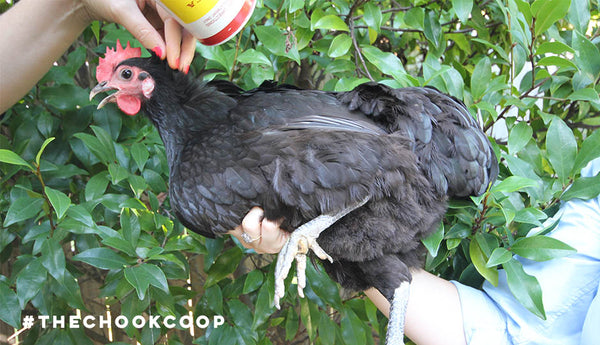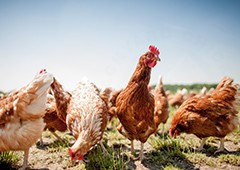How To Help Battery Hens Adjust To The Sweet Life
It’s hard to comprehend the steady procession of horrors battery hens are exposed to from the time they are born. Most chicken lovers well-up with emotion when they begin to contemplate what caged chickens suffer in the name of cheap eggs. Chickens are kind and gentle creatures and deserve to live la dolce vita (“the sweet life”). Many caring chicken owners already have, or may be considering adopting battery hens, so that they can enjoy the final years of their life in a safe, free and loving environment. However, the adjustment period isn’t always smooth sailing. After all, most of these hens haven’t ever scratched their toes against the earth or ecstatically bathed themselves in dust. Freedom, for those who have not experienced it, takes some getting used to. Here are some things to expect and consider if you are planning on generously adopting a battery hen into your home.
Give Them Time
Most battery hens have been deeply traumatised by their experience and it can take them some time to adjust to life as a free chicken. To begin with, they won’t do things that most chickens do naturally, like perching or resting in their nesting box. Similarly, being given the opportunity to roam free in their run or yard can be an overwhelming and frightening prospect for most former battery hens. Some new owners get concerned or frustrated by their new chickens reluctance to accept and enjoy the newfound freedom they’ve been offered, but the important thing to know is that this is all a part of the process. Most chickens will eventually adjust to their newfound surroundings. So long as there aren’t major pecking order disputes between your nervous former battery hens and the other chickens, they will soon learn how they can enjoy their new surroundings through observation. Interfering with this natural process of adjustment can confuse, frighten or offend these resilient little chooks- so it’s best to just let nature take its course.
Adjusting To Your Home
There are many things unique to your home environment which can be an obstacle to your newly adopted hens making a successful adjustment. For example, if you have domestic animals, like dogs, the battery hens might be nervous, flighty or perhaps even aggressive around them- even if you have other chickens that have adjusted to the company of your other pets. Also, as I mentioned before, even being in the presence of other chickens they can interact with can be a distressing and confusing thing for your newly freed hens. It’s important that you take extra care when introducing your battery hens to anything that will be new for them- which is basically everything. These hens have mostly come from filthy environments with no love, no social life and no entertainment. Imagine if someone freed you from a similar circumstance and expected you to immediately know what to do- it’s overwhelming to say the least, so just keep this in mind.

Keep An Eye On Their Health
Most former battery hens have below average health compared to other chickens. After you’ve freed your battery hens from a life of punishment it’s vital that you get them the necessary vaccinations, as well as treating them for worms, parasites and coccidiosis or other diseases when relevant. Generally speaking, it would be a good idea to take these hens to the vet immediately after adoption, just to ensure that they are treated for any undiagnosed diseases or afflictions.
Another thing to note when considering the health of battery hens is that their nails are sometimes overly long. Free chickens are often scratching on the ground and in the dirt, which in turn keeps their nails comfortable and trimmed. As your hens adjust to the free life, their nail length will begin to reduce, however, you may want to gently trim their nails for them with clippers if it seems essential. Just remember to be careful, as clipping nails can occasionally result in bleeding. Given the delicate frame of mind these former battery hens are in, it might be best to avoid any treatment that may result in any further trauma, unless it’s entirely necessary.
Make Them Feel Safe With A Sturdy Home
Initially it might be best for you to keep your former battery hens inside the house, as many of them have lost their feathers in captivity. A hen without her feathers is more susceptible to extreme weather conditions, as well as cuts, scratches and bruising. Once you have improved your hens diet, their feathers will start to grow back and you will be able to move them out into the coop.

The living standards that most battery hens are subjected to are extremely poor. In the event you decide to invite one of the precious hens into your home, be sure you can house them properly. Ideally you’ll have a coop in which they can eventually perch, like The Penthouse, however as I mentioned previously, it may take them some time to adjust. In the mean time most of your newly adopted battery hens will sleep on the floor. In order to make their well deserved sleep more restful, lay some comfortable straw along the bottom of the hutch or wherever they’re sleeping. Soon enough, your new hens will find themselves get cosy and sleeping with the other girls on the perch.
Another thing to consider is that a strong sturdy coop is a great defence against extreme weather conditions, as well as other predators, like stray cats, dogs, foxes and so on. It would be beyond unfortunate for your hens if they were to be adopted into a lovely home only to have their lives tragically cut short by the hands of some preventable force.
Most of all, your new hens are going to need lots of love, support and patience as they adjust to the sweet life. They have been through genuine atrocities and its important that you demonstrate patience and concern as they begin to navigate their way across a whole new world.
If you’re considering freeing some hens from a life of torment, make sure they’ve got a great safe coop to live in, like the Taj Mahal, Penthouse or Mansion.
Whether you save some chooks or hatch some, we all want to do an eggcellent job when caring for our feathered friends. There are plenty of things to consider when becoming a chicken parent from health to nutrition. Many chicken keepers struggle to handle chicken health or behaviour issues, especially in the first few years of having a flock.
This is why I recommend Chickenpedia to all my readers. They have comprehensive online courses on everything you didn’t know you need to know and then some more! From healthcare to raising baby chicks to feeding and behavior, you’ll find beginner-friendly courses that’ll give you the knowledge and confidence to successfully look after your chickens.
As a member, you will get access to ALL their fantastic courses. No need to wing it, become the ultimate chicken eggspert! Check out Chickenpedia today!


















